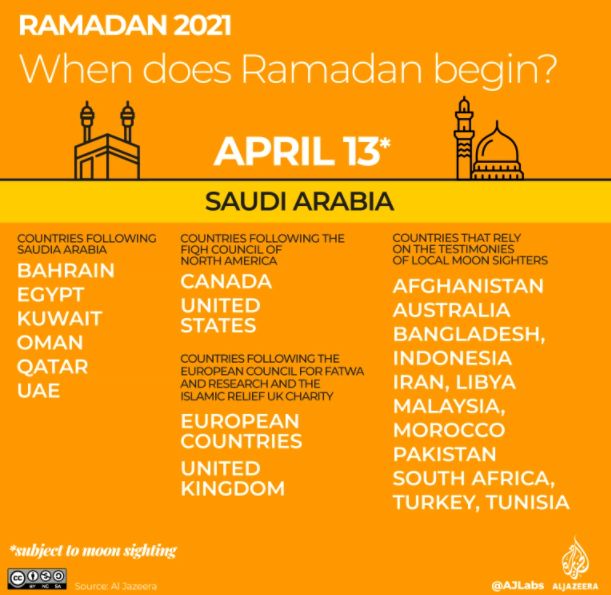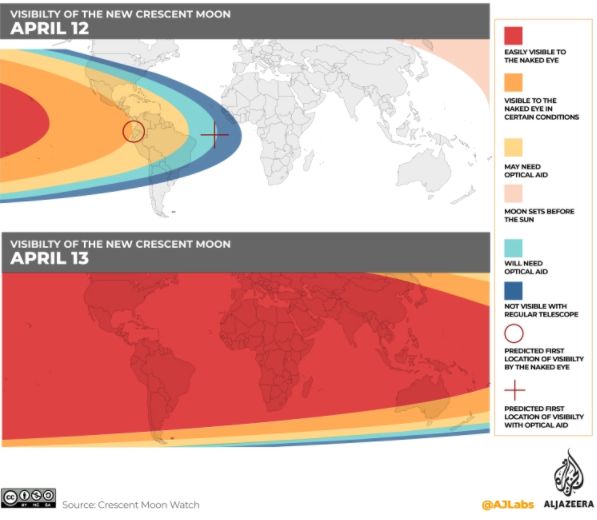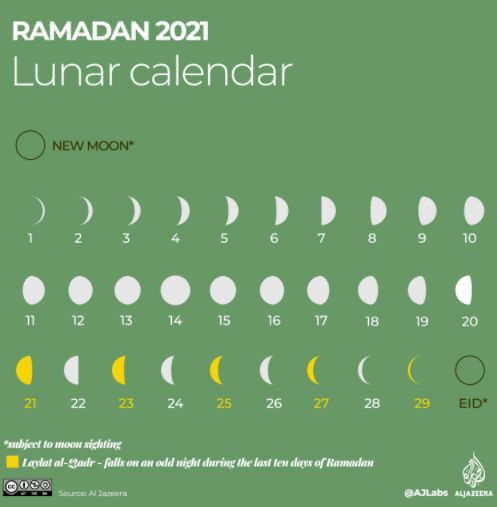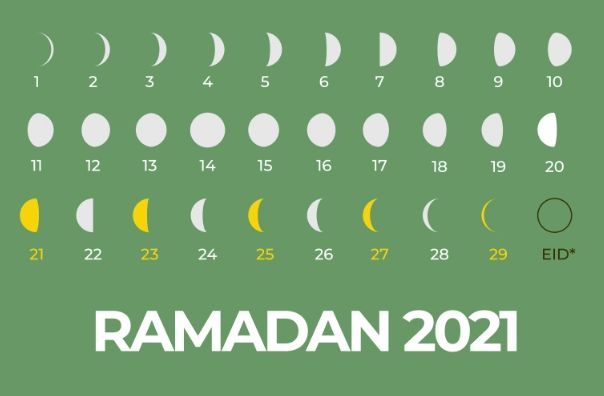The first day of fasting for the holy month of Ramadan, which is determined by the sighting of the new moon, is likely to be Tuesday, April 13.
To declare the beginning of Ramadan, Saudi Arabia and other Muslim-majority countries depend on the testimonies of local moon sighters.
Bahrain, Egypt, Kuwait, Oman, Qatar and the United Arab Emirates are all expected to follow Saudi Arabia’s sighting of the new moon.
Other countries have independent sightings, but Indonesia, Lebanon, Morocco and Syria are also likely to begin fasting starting Tuesday while countries further east and west will commence as the moon is sighted.

When can we see the new moon?

The Qatar Calendar House (QCH) has announced that Ramadan’s new moon will be born on April 12 at 02:31 GMT, according to astronomers. On that day, the moon might be visible in parts of North, Central and South America. On April 13, the moon will be easily visible in most parts of the world.
The actual visibility of the crescent will depend on factors such as atmospheric conditions, cloudiness and the distance between the sun and the moon on the horizon.
The moon phases of Ramadan

Lunar months last between 29 and 30 days, depending on the sighting of the new moon on the 29th night of each month. If the new moon is not visible, the month lasts 30 days.
Why is Ramadan holy?
For Muslims, Ramadan is the month in which the first verses of the Quran, Islam’s holy book, were revealed to Prophet Muhammad more than 1,400 years ago.
Throughout the month, observing Muslims fast from just before the sunrise, or Fajr, prayer to the sunset prayer, Maghrib.
The fast entails abstinence from eating, drinking, smoking and sexual relations to achieve greater “taqwa”, or consciousness of God.
Fasting is one of the five pillars of Islam, along with the Muslim declaration of faith, daily prayers, charity, and performing the Hajj pilgrimage to Mecca if physically and financially capable.
In many Muslim-majority countries, working hours are reduced, and many restaurants are closed during fasting hours.
“Ramadan Mubarak” and “Ramadan Kareem” are common greetings exchanged in this period, wishing the recipient a blessed and generous month respectively.
Last year, fasting hours across the world ranged from 10 to 20 hours a day.
At the end of Ramadan, Muslims celebrate Eid al-Fitr. In Arabic, it means “festival of breaking the fast”.
Depending on the actual start date of Ramadan and the new moon sighting on the 29th night of Ramadan, Eid al-Fitr this year is likely to fall on May 12.
Latest Stories
-
Are the financiers of galamsey the same individuals funding party politics?
3 minutes -
Brothers, is your libido worth your life? Let’s talk Blood Pressure, Herbal Mixtures, and Silent Deaths
43 minutes -
Over 5,000 delegates expected at NPP National Conference
3 hours -
NDPC Chairman calls for local economic development at UN HLPF
3 hours -
US tech CEO suspended after Coldplay concert embrace goes viral
5 hours -
Self-acclaimed Ashanti Regional Chairman of Delta Force arrested
5 hours -
Police nab three in Ashanti region for distributing fake insecticides from Nigeria
6 hours -
Detailed constitutional proposals for NPP Delegates Conference today
6 hours -
NPP holds National Delegates Conference Today
6 hours -
Asantehene calls for ‘Ghanaians first’ in mining concessions
10 hours -
See the 14 crucial NPP reforms proposed by the Council of Elders
10 hours -
59 proposals: Why the NPP is overhauling its constitution
10 hours -
Scrap ‘elitist’ Special Electoral College – Sir Obama tells NPP
11 hours -
Gov’t ramps up election security ahead of Akwatia by-election
11 hours -
Erpreben Travel & Tour donates air conditioners to Osu District Police Command
12 hours

